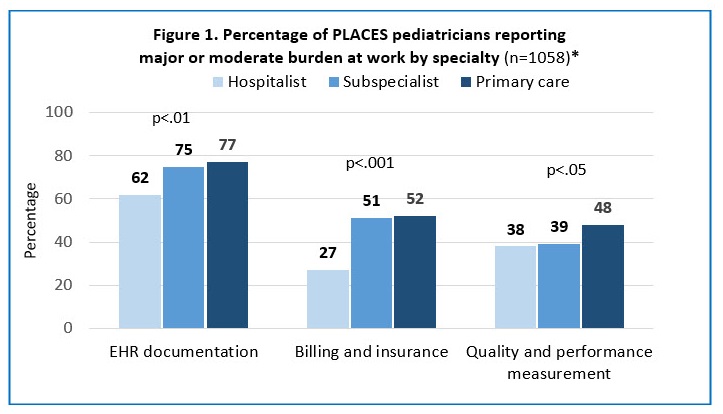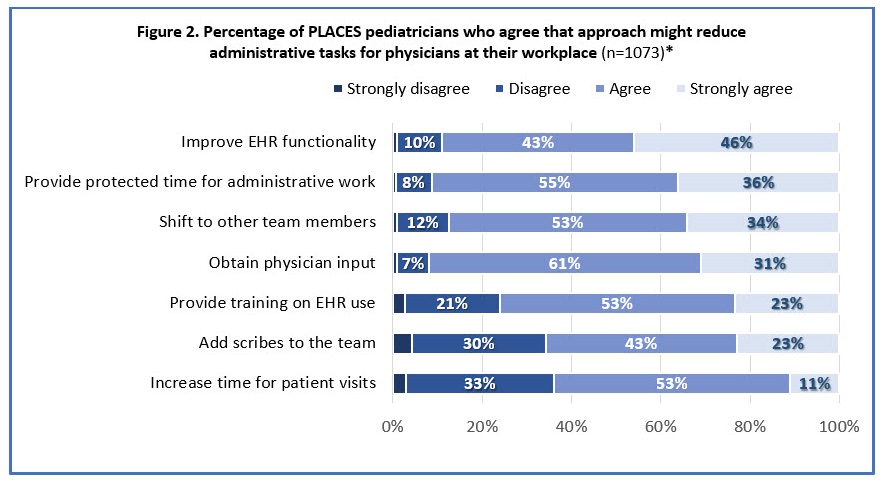Frintner MP, Kaelber D, Kirkendall E, Lehmann C, Lourie E
Accepted for 2020 Pediatric Academic Societies Annual Meeting
Background: Reducing administrative tasks has been shown to reduce pediatrician burnout and enhance wellness. However, little knowledge exists on which administrative tasks are most onerous for physicians.
Objective: Assess early and midcareer pediatricians' perspectives on administrative tasks and approaches to reduce burden.
Methods: We analyzed national cross-sectional data collected in 2018 from the American Academy of Pediatrics Pediatrician Life and Career Experience Study (PLACES), a longitudinal study of early to midcareer pediatricians. Those who graduated in 2002-04 or 2009-11 from residency were asked about administrative tasks (3 items) and approaches to reduce burdens for physicians (7 items). Of 1798 pediatricians, 1249 completed the survey (69%); analytic sample=1073. Chi-Square examined variations in views on tasks and approaches by specialty (primary care, hospitalist, subspecialist). McNemar tests were used to identify the most common tasks and approaches, separately for each specialty.
Results: 75% of pediatricians reported EHR documentation was a major or moderate burden; 49% reported such burden for billing and insurance and 43% for quality and performance measurement (QI). Primary care pediatricians and subspecialists were more likely than hospitalists to report that EHR documentation (77%, 75% and 62%, respectively, p<.01) and billing and insurance (52%, 51%, and 27%, p<.001) tasks were major or moderate burdens (Figure 1). Primary care pediatricians were also more likely to report that QI tasks were an administrative burden, p<.05. Each group was more likely to report EHR documentation as more burdensome than billing and insurance (p<.001) and QI tasks (p<.001).
The top approaches to reduce administrative burden were identified as improve EHR functionality, provide protective time for tasks, and obtain physician input (Figure 2). These views were fairly consistent across specialty; 3 of 7 approaches varied modestly. For example, 51% of subspecialists, 43% of hospitalists and 42% of primary care physicians strongly agreed that improve EHR functionality might reduce administrative tasks, p<.05. For both primary care pediatricians (p<.01) and subspecialists (p<.001), improve EHR functionality was the most common approach to reduce administrative tasks.
Conclusions: Among administrative tasks, EHR documentation is most burdensome for early to midcareer pediatricians, with 3 in 4 who report being highly burdened. Large majorities believe improving EHR functionality will reduce administrative tasks on physicians at their workplace.
 *AAP PLACES 2018 (2002-04 and 2009-11 Residency Graduates Cohort). Chi-square examined burden (major or moderate vs minor or no burden) for each area by specialty (p-value represents result).
*AAP PLACES 2018 (2002-04 and 2009-11 Residency Graduates Cohort). Chi-square examined burden (major or moderate vs minor or no burden) for each area by specialty (p-value represents result).

*AAP PLACES 2018 (2002-04 and 2009-11 Residency Graduates Cohort). Chi-square examined burden (major or moderate vs minor or no burden) for each area by specialty (p-value represents result).